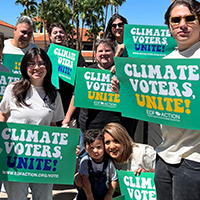House of Representatives Advances Unprecedented Investment to Fight Climate Crisis
EDF Action Statement from Elizabeth Gore, Senior Vice President, Political Affairs
Contact:
“The House of Representatives passed the Build Back Better Act this morning, a bill that includes more than $500 billion to address the climate crisis. It is a blueprint for action that will create millions of jobs, curb climate pollution, clean the air, and advance environmental justice. This is the most ambitious bill ever passed to combat the climate crisis.
“In recent weeks, we have seen remarkable momentum building in the fight against climate change. Congress recently passed the bipartisan Infrastructure Investment and Jobs Act, a valuable and necessary investment in America’s future. In addition, President Biden announced a set of sweeping actions to cut methane pollution here in the United States, and over a hundred countries have jointly pledged to cut methane emissions.
“Now, the Senate must quickly pass the Build Back Better Act and move the United States toward a cleaner, healthier, and more equitable future. We cannot afford to miss this moment.”
- Elizabeth Gore, Senior Vice President, Political Affairs
The Build Back Better Act will make historic investments in:
- Clean electricity and electric vehicles, energy-efficient buildings, clean technology manufacturing and supply chains in the U.S., and more resilient, climate-smart agriculture aimed at driving down climate pollution throughout the entire economy
- Energy and transportation incentives that will save consumers money. The White House estimates the plan will reduce energy costs for families by up to $500 a year over the next decade. It will also give consumers up to $12,500 in rebates for buying clean electric vehicles.
- Tax incentives to help deploy more zero-emissions trucks and commercial vehicles.
- Critical environmental justice initiatives:
- A new Clean Energy and Sustainability Accelerator program that will invest in clean energy projects around the country and will deliver 40% of the benefits of those investments to systematically disadvantaged communities as part of the President’s Justice40 initiative;
- Funding for port electrification, cleaner transit, buses and trucks and more to drive down hazardous air pollution that endangers the health and well-being of millions of Americans — especially low-income communities and communities of color.
- $3 billion in grants for disadvantaged communities to address the disproportionate impact of pollution and climate change;
- More than $10 billion for rural communities to transition to clean energy;
- $4 billion to reconnect communities of color who have been decimated and divided by highway infrastructure projects;
- Weatherizing homes to reduce the energy burden for low- and moderate-income families.
- Targeted incentives to directly create or support high-quality domestic jobs in every state. For U.S. supply chains and technologies, like batteries and solar, these incentives will boost our competitiveness in these emerging markets. They will also help U.S. industries like steel, aluminum and cement gain new opportunities and markets for low-carbon products.
- Increased air pollution monitoring and mitigation, with a focus on using high-quality data to help those who are most vulnerable with solutions proven to have the greatest impact.
- Community protection along our coasts and watersheds, particularly through natural infrastructure and other cost-effective solutions to increase their resilience to growing climate threats.
- Agriculture, forestry and rural communities to implement nature-based solutions and clean energy, support rural water quality and build small-town economies. As farmers and foresters grapple with climate-induced weather events, the conservation and forestry investments will give producers the tools to adapt, build resilience and contribute to the climate solutions.
- A Civilian Climate Corps to train and put hundreds of thousands of young people to work in our communities to help recover from wildfires, floods and other disasters as well help communities adapt to climate change.



